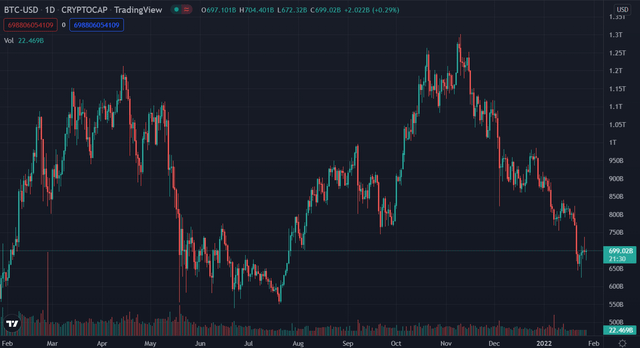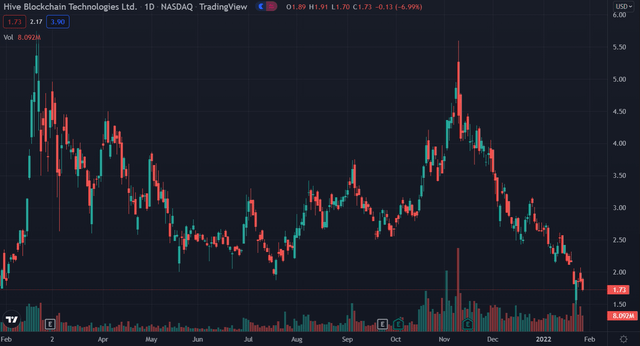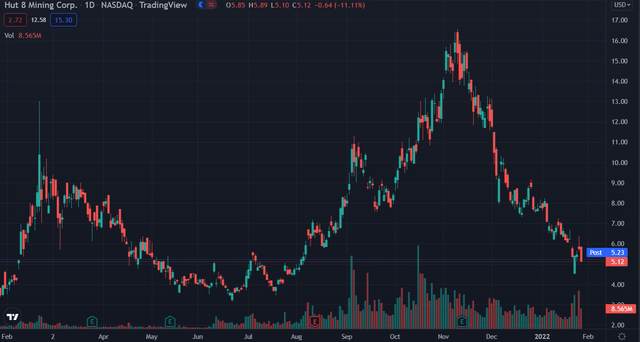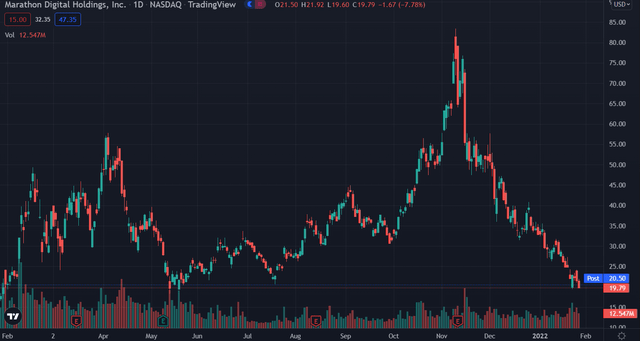Just_Super/E+ via Getty Images
HIVE Blockchain Technologies Ltd. (HIVE) is a profitable company to trade when investors understand the simple elements associated with the movement of its share price.
While we’ll primarily look at HIVE as a proxy for Bitcoin (BTC-USD), we’ll also look at Hut 8 Mining Corp. (HUT) and Marathon Digital Holdings (MARA) in order to contrast companies trading at different price points.
The reason I’m doing that is to confirm and reinforce the fact that they move in unison with the price movement of Bitcoin no matter what the share prices of the companies are.
Another reason is to show readers that no matter how the companies break down their businesses, and no matter how financial writers and analysts point out differences between the companies, the reality is, none of that matters at this stage of Bitcoin’s acceptance and growth.
As I’ll prove to you, there is only one thing that matters when considering these companies, and that is the price and price movement of the flagship crypto.
As Bitcoin’s price goes, so goes HIVE
It can seem daunting at times to trade HIVE and similar companies because of the noise related to Bitcoin and the companies with exposure to it. A lot of this comes from commentary on social media and other media outlets concerning the why behind Bitcoin price movements, the seemingly endless amount of price ranges offered technical analysis on both sides of the play, and the differences between the companies pointed out in a way that suggests that is what is driving the performance of the companies.
The good news is all of that can safely be brushed aside. There is only one thing any investor in Bitcoin proxy companies need to consider, and that is the price movement of Bitcoin; nothing else is relevant.
Something else to take into account is Ethereum (ETH-USD). Some of these companies have significant exposure to the second-largest cryptocurrency by market cap, yet there is no reason to watch that either; it will only distract from watching Bitcoin.
The reason I mention this is obvious: the price of Bitcoin and Ethereum almost always move in unison with one another. For that reason, watching both of them is pointless. Some time back the effort was made to suggest Ethereum, and Bitcoin were decoupling, but that never played out like suggested. Again, things like that are only distractions.
Some will object to this by asserting the fundamentals of these companies are drivers of their performances as well. That’s easy to disprove. Look below at the Bitcoin chart and compare it with the share price movement of HIVE, Hut 8 Mining Corp. and Marathon Digital Holdings. You’ll find that the market’s bid is always in unison with the price movement of Bitcoin.
I’m going on about this because it’s important to understand the simplicity of investing in these types of companies. We need to discipline ourselves to ignore everything else but the price of Bitcoin.
Long into the future when price discovery for Bitcoin is known, these things could change. That time is not now.
Forget about any catalyst for these companies except the price movement of Bitcoin.
Three-month chart Bitcoin

Trading View
Three-month chart HIVE

Trading View
Three-month chart HUT

Trading View
Three-month chart MARA

Trading View
Why these companies are safe now
When investors think in terms of Bitcoin, the impression, because of its volatility, is that it’s a very unsafe investment. That couldn’t be further from the truth.
After all, what other market sector can almost guarantee that its price will regain its upward momentum after big crashes, and do it in a relatively short time? That doesn’t mean there isn’t any risk. The risk comes from those that take a position after much hype about the soaring price of Bitcoin, buying near the top and having to painfully watch as they’re caught holding the bag.
Even those getting in near the highs will, I think, eventually generate a profit if they HODL. What they do lose is access to capital they could have deployed in other profitable companies, along with valuable time as they wait for the price of Bitcoin to jump past their entry point.
For example, if HIVE was bought when it was trading above $5.00 per share, it’ll take time for the company to get back to that point and surpass it. While there’s no doubt in my mind it’ll go far beyond $5.00 per share, the question is how long it’ll take to do so. That’s the same with MARA and HUT as well.
The general difference is that companies trading at higher prices tend to rise quicker than a company like HIVE which trades at a lower share price.
Interestingly to me, there is never a safer time to trade proxy Bitcoin companies than during a correction. Even if there is a bounce off what is perceived to be a low that doesn’t hold, it’s only a matter of time before it bounces back.
That’s one thing to consider when trading these companies. The volatility of Bitcoin makes it difficult to know if the entry point is coming off a real bottom, or there is more room to fall. That’s why being patient is crucial to success under these conditions.
Why I say it’s very safe once there is a significant correction is because I think the price of Bitcoin is nowhere close to reaching a top. If traders get in and the price goes against them, they can wait until it continues its upward move. Contrary to holding Bitcoin on its own, I think investors should think differently concerning holding over the long term with proxy companies. The reason why is Bitcoin will continue to go through significant corrections and taking profits off the table and redeploying capital allows for many opportunities to generate profits.
Set-and-forget is good for Bitcoin, but I think taking profits and keeping some dry powder available for the next correction offers better opportunity for larger gains.
How to trade these types of companies
The thesis of this article is companies that are proxies of Bitcoin aren’t subject to the fundamentals other companies are, as it relates to the impact on their share price.
Even so, there are several things to take into consideration. They include CapEx, cash on hand, and access to capital. Investors need to know these companies can keep the doors open in case of a prolonged period of depressed Bitcoin prices. Most companies aren’t in danger because Bitcoin doesn’t stay down long. Nonetheless, it’s important to beware of a company’s balance sheet when considering taking a position in them. With that in mind, we’ll look at the strategies that are best to use under the volatile economic conditions we’re now under.
The first decision to make is whether or not to take a position in the first place. At times the best action to take is to sit on our cash until we’re sure of the direction the market is taking.
As mentioned earlier, that’s not as easy with the highly volatile and rapidly moving Bitcoin, when compared with most other asset classes. Bitcoin can drop a couple of thousand dollars, take a temporary breather, and then resume its downward trajectory.
For example, look at a three-month chart of Bitcoin and see how it can move in either direction by many thousands of dollars, even as it continues to slide. The chart may not look much different than other charts, but even some of what appear to be smaller moves can be $3,000 or more.
What that does is make it difficult to identify whether or not Bitcoin has reversed direction or not. For that reason, after a significant downward move, I think it’s best to use dollar-cost averaging and position sizing as the tools to mitigate risk as a position is being built.
One thing to bear in mind concerning dollar-cost averaging is it’s different than most other asset classes when taking positions in these companies. The major difference is the timeframe usually contracts with HIVE and similar companies. What may take months, a year, or even longer when using dollar-cost averaging for a typical company, can many times be completed in one day, a week. or possibly a little longer.
Looking back on the price movement of Bitcoin over the last several years, it is rare for it to consolidate for longer than three months. One exception was an approximate four-month period from the end of 2018 through March 2019.
Under those circumstances, Bitcoin was close to a bottom, so all an investor could do was to wait for the cryptocurrency to resume its upward trajectory. Because of the volatility of Bitcoin, I prefer not to look for an absolute bottom and wait for an upward price movement to confirm it before taking a position, like most of us would do with regular stocks. Again, the quick and wide movement of Bitcoin’s price doesn’t lend itself well to this strategy. This is why position sizing is important when dollar-cost averaging.
I’ve been building a position in HIVE using this technique. What I did was determine the largest amount of capital I’m willing to spend, and based upon the price movement of HIVE, have been adding to my position to lower my cost basis while increasing my share count.
With the negative catalysts and sentiment now part of the psychology of the market, I’m not quite as aggressive as I would have been under more favorable conditions. Consequently, there have been a couple of times I could have gotten a real nice price for HIVE, but I thought it could drop much further, so didn’t take the opportunity. That was a mistake of omission on my part.
The reason I kicked myself for it was because I should have known better. After all, if you’re dollar-cost averaging and position sizing, the whole point is to jump on the price when it drops below the recent entry points. If it drops further after adding to your position incrementally, it provides another opportunity to lower your cost basis.
While focusing on HIVE here, the same methods can be used for MARA, HUT, and other companies whose share price moves in conjunction with Bitcoin.
The key to success is to wait long enough for the price of Bitcoin to fall far enough to provide a measure of safety. As I mentioned earlier, I don’t see much in the way of risk concerning the price of Bitcoin over the long term, but if we get too excited and enter too quickly, it can tie up our capital for a longer period of time than we wish, and it also decreases the amount of potential profits of the holding.
This is why once I see a significant downward move in price, I will wait a bit to see if it holds, and if it does, I take an anchor position I can work from. Under the current correction concerning the price of Bitcoin, I took a smaller initial position in order to give myself room to significantly lower my cost basis if the price of Bitcoin continues to fall in a meaningful manner.
One psychological element to consider is this: If we take a smaller position and the price of Bitcoin starts an upward run, we won’t generate near the profits we would if we had taken a larger position. That’s a tradeoff I’m willing to make.
Conclusion
HIVE and similar Bitcoin proxy companies offer an extraordinary opportunity in a tough market. Because of that potential, we need to remain disciplined in deploying our capital, being willing to take a smaller gain if it requires in order to maintain a margin of safety.
I see little, if any risk, in regard to the price of Bitcoin going forward. I think it will eventually reverse direction and head toward another record high. While I don’t think it’s going to be long before that happens, it should be understood that there have been times after a correction when Bitcoin took as much as several months to resume its upward move. We can’t allow ourselves to be scared out of our holdings and leave a lot of profits on the table.
We do have to be aware of the risk-off trade we now face, and the fear associated with it. This is why I’m investing a lot more defensively in this sector than I normally do.
The bottom line is there is nothing else to do than watch the price movement of Bitcoin and take our opportunities to build our positions in these companies, remembering to watch the balance sheets in case they’re close to becoming insolvent.
I’m not concerned at this time about the three companies mentioned in this article, but there are a lot of companies out there that could struggle immensely if the price of Bitcoin remains down for a prolonged period of time.
